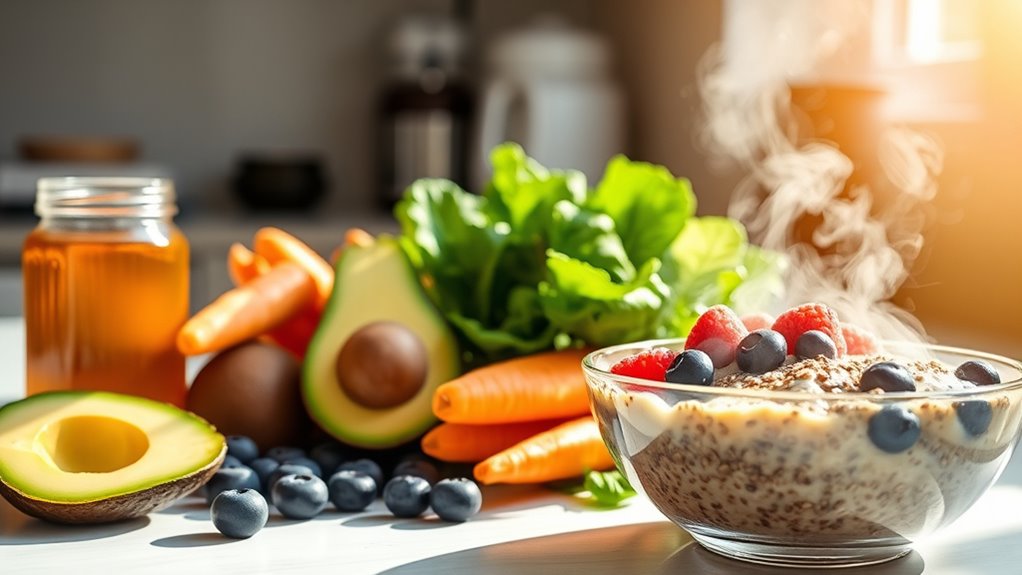Your nutrition plays a key role in your mental well-being by supporting a healthy gut-brain connection. Consuming nutrient-rich foods like fruits, vegetables, and healthy fats helps maintain ideal brain function and emotional stability. A balanced diet promotes the growth of beneficial gut bacteria, which produce mood-boosting chemicals like serotonin. If you want to understand how your food choices can boost your mental resilience, there’s more to discover below.
Key Takeaways
- Nutrient-rich foods support brain structure, neurotransmitter production, and overall mental health.
- A healthy microbiome, maintained by good nutrition, influences mood and emotional stability.
- Deficiencies in B vitamins, magnesium, zinc, and omega-3s impair cognitive function and increase anxiety or depression.
- Proper nutrition helps regulate the brain-gut connection, reducing mental health imbalances.
- Consuming a balanced diet enhances resilience, emotional regulation, and mental well-being.

Good nutrition plays a crucial role in supporting your mental well-being. The connection between what you eat and how you feel isn’t just a myth; it’s rooted in the remarkable brain-gut connection. Your gut isn’t just responsible for digesting food—it communicates directly with your brain through a complex network of nerves, chemicals, and hormones. When your gut health is ideal, it can help regulate mood and reduce feelings of anxiety or depression. Conversely, poor nutrition can disrupt this connection, leading to imbalances that affect your mental health. Nutrient deficiencies, in particular, play a significant role here. If your diet lacks essential vitamins and minerals like B vitamins, magnesium, zinc, or omega-3 fatty acids, your brain’s functioning can suffer. These nutrients are essential for neurotransmitter production, brain cell repair, and overall cognitive health. For example, a deficiency in B12 or folate can lead to fatigue, irritability, and concentration issues, all of which impact your mental well-being.
When you don’t get enough of these nutrients, your body struggles to produce the chemicals needed for a balanced mood, causing feelings of anxiety or depression to intensify. The brain relies heavily on a steady supply of nutrients to maintain its structure and function effectively. Without them, you might notice mood swings or trouble managing stress. It’s not just about avoiding deficiencies but proactively nourishing your brain and gut with nutrient-rich foods. Incorporating a variety of fruits, vegetables, lean proteins, whole grains, and healthy fats can help bridge the gap. These foods provide the essential building blocks your body needs to maintain ideal mental health. Additionally, maintaining a healthy microbiome**** supports optimal neurotransmitter production and emotional resilience.
Understanding the brain-gut connection also emphasizes the importance of diet in your overall mental resilience. A well-balanced diet supports a healthy microbiome, which influences your mood, cognition, and emotional stability. When your gut bacteria thrive, they produce neurotransmitters like serotonin, which is often called the “feel-good” chemical. Around 90% of serotonin is produced in your gut, highlighting how critical gut health is for your mental state. Therefore, neglecting proper nutrition can lead to an unbalanced microbiome, impairing this production and exacerbating mental health issues. To support your mental well-being, you should prioritize nutrient-dense foods, be mindful of potential deficiencies, and foster a healthy gut environment. Doing so empowers your body to produce the chemicals and signals needed for a balanced, resilient mind.
Frequently Asked Questions
Can Specific Foods Instantly Improve Mood or Reduce Anxiety?
You might wonder if certain foods can instantly boost your mood or ease anxiety. While no food works as an instant mood booster, some anxiety relief foods, like dark chocolate or bananas, can help you feel calmer over time. Eating balanced meals regularly supports mental well-being, but don’t rely solely on food for quick fixes. Consistent nutrition plays a bigger role in managing mood and anxiety naturally.
How Does Hydration Affect Mental Health and Cognitive Function?
It’s funny how we often overlook hydration, yet fluid intake has a huge impact on cognition. When you’re dehydrated, your mental clarity drops, and concentration suffers. Staying properly hydrated boosts your brain function and mood, proving that a simple glass of water can do more for your mental health than many supplements. So, don’t underestimate the power of hydration—your brain’s performance depends on it.
Are There Supplements Proven to Boost Mental Well-Being?
You might wonder if mental health supplements really work. While some, like omega-3s, vitamin D, and B-complex, show promising supplement efficacy, results vary for each person. It is crucial to know that not all mental health supplements are proven to boost well-being, and consulting a healthcare professional helps ensure safety and effectiveness. Ultimately, combining supplements with a balanced diet and healthy habits offers the best chance for improved mental health.
What Role Does Gut Health Play in Mental Health?
Imagine you’re living in the 18th century, unaware of the microbiome’s importance. Your gut health, linked to the gut-brain axis, markedly influences mental well-being. A diverse microbiome promotes better communication between your gut and brain, affecting mood and cognition. When your microbiome diversity suffers, mental health may decline. So, nurturing your gut through balanced nutrition supports a healthy gut-brain axis, ultimately boosting your mental resilience and emotional stability.
How Does Nutrition Influence Long-Term Mental Health Outcomes?
You understand that nutrition critically influences your long-term mental health outcomes. Poor dietary patterns and nutrient deficiencies can increase risks of depression, anxiety, and cognitive decline. By adopting balanced eating habits rich in essential nutrients, you support brain function and emotional stability. Consistently nourishing your body with nutrient-dense foods helps maintain mental resilience and promotes overall well-being over time, highlighting the essential link between what you eat and how you feel.
Conclusion
By now, you see how essential nutrition is for your mental health. Eating balanced, nutrient-rich foods can boost your mood and resilience. Did you know that studies show people who maintain healthy diets are 30% less likely to experience depression? So, make mindful choices and prioritize your well-being. Small changes in what you eat can lead to a happier, more balanced mind. Your mental health deserves the right fuel—start today.









